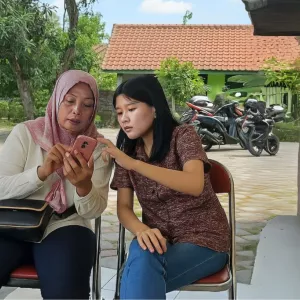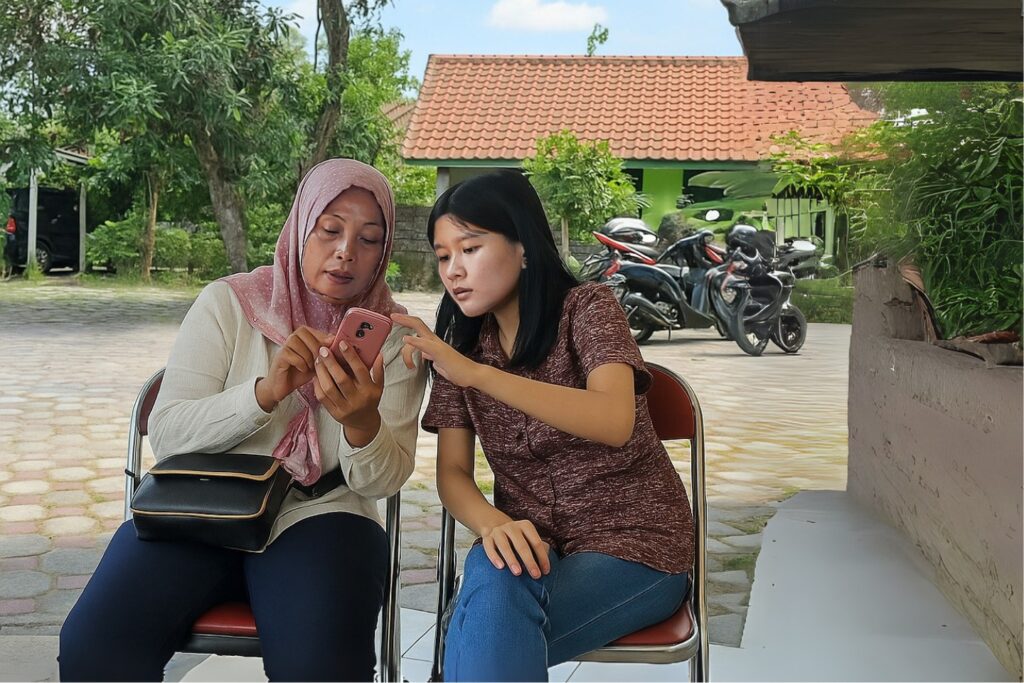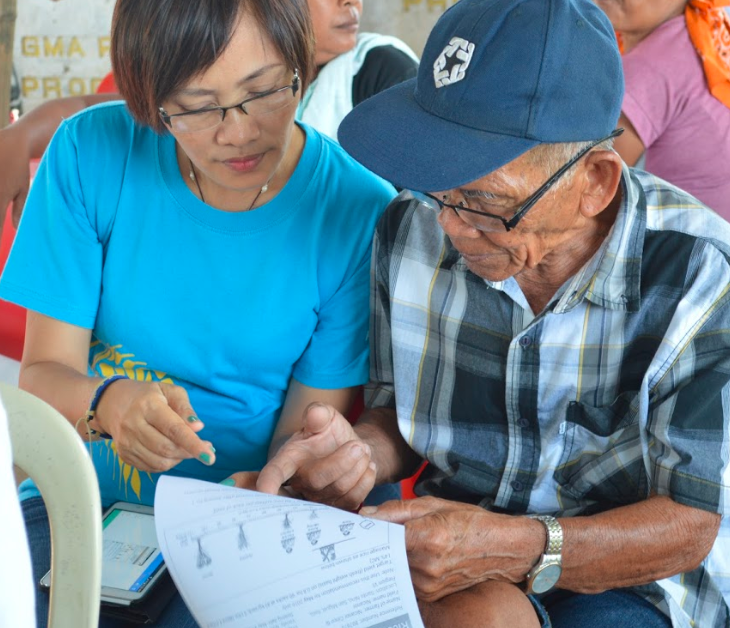From Science to Scale: How Rice Crop Manager Is Revolutionizing Farming for Millions
By Rowena Castillo, Benedict Jardinero and Kazuki SaitoInternational Rice Research Institute (IRRI) Indonesian farmer looking at the recommendation provided by Layanan Konsultasi Padi (Rice Crop Manager for Indonesia) through her mobile phone. (Photographed by Jo Anne Holly Torres-Ilagan) When smallholder rice farmers open a text message on their mobile phone and see a tailored fertilizer and crop management recommendation just

From Science to Scale: How Rice Crop Manager Is Revolutionizing Farming for Millions
By Rowena Castillo, Benedict Jardinero and Kazuki Saito
International Rice Research Institute (IRRI)

When smallholder rice farmers open a text message on their mobile phone and see a tailored fertilizer and crop management recommendation just for their field, they are benefiting from over three decades of agricultural science research, innovation, collaboration and partnership. That simple text, which is easy to read, timely, and field-specific is the product of a quiet revolution in rice farming: the Rice Crop Manager (RCM). RCM empowers farmers not just to follow recommendations, but to make informed choices about what to apply, when, and how much based on their own field conditions.
Since its inception in 2013, RCM has generated more than 4 million field-specific crop and nutrient management recommendations across five countries in Asia including Bangladesh, India, Indonesia, the Philippines, and Vietnam. This is more than just numbers. It represents better harvests, higher incomes, better and efficient use of resources and lower pollution for millions of rice farmers.
The seeds of innovation: Site-Specific Nutrient Management (SSNM)
The scientific backbone of RCM is the Site-Specific Nutrient Management (SSNM) approach, developed by IRRI and its partners in the early 1990s for smallholder rice production systems in Asia to address large variability among farms and fields in their seasonal plant nutrition needs. Instead of blanket fertilizer advice, it offered tailor-made recommendations based on each field’s estimated crop response to applied nutrients, soil nutrient supplies, climate, crop variety, and farmer’s practices.
SSNM offered effective nutrient management recommendations, but it required a delivery mechanism to reach farmers. Advances in information technology and mobile communications that utilize decision trees and algorithms made it possible to generate field-specific recommendations by using web- and smartphone-based app like RCM.
Turning research into actionable recommendations
RCM turned the rigor of SSNM into a user-friendly app for extension workers and farmers. Through smartphones or computers, users input basic details such as the field location, crop variety, planting date, crop establishment, water source and status, and harvest method. RCM returns a simple, field-specific advice: what fertilizers to use at what time and how much based on a set target yield for a field.
This recommendation is delivered as a single-page printout or text message, making it accessible even in areas with limited internet. RCM’s accessible format helps reach smallholder farmers, including women farmers who often face barriers to traditional extension services. In doing so, it supports not just better yields, but more equitable farming systems.
The results? In the Philippines, farmers using RCM saw an average yield increase of 0.3 to 0.4 tons/ha which translates to an extra USD 110 to 154/ha (Banayo et al., 2018; unpublished data from on-farm trials). In India, the gain was even higher at 0.5 tons/ha and USD 150/ha in added income (Sharma et al., 2019). In Indonesia, the average gain in yield was 0.4 tons/ha and USD 173/ha in added gross return above fertilizer cost (Girsang et al., 2025).
“There’s a big difference with our yield before and now. Before in my 1 hectare, I gained 60-80 sacks of rice. However, during the last cropping, I gained 118 sacks of rice using RCM”, says Mr. Geronimo Alterado, farmer from Zamboanga Sibugay, Philippines.
“Here in Madalag [Aklan], the average production is 3.2 metric tons and increased to 4.2 metric tons using the RCM method,” notes Mary Ann Padalhin, Municipal Agriculture Officer from Aklan province, Philippines.
Growing across borders
RCM has evolved into various country-specific versions, each carrying a local name to enhance relevance, ownership, and adoption among farmers. These include Rice Crop Manager Advisory Service (RCMAS) in the Philippines, Crop Manager for Rice-based Systems and Rice-Wheat Crop Manager in India, Layanan Konsultasi Padi in Indonesia, and Fertilize Right Vietnam (Ứng dụng Bón phân đúng) in Vietnam. Behind each localized version of RCM is a process of co-designing and co-creation with NARES, local extension workers, and even farmers themselves shaping the content and format to fit local needs and languages. This ownership has been key to RCM’s sustained relevance.
RCM’s journey began in the Philippines, where over 3.5 million recommendations have been issued through partnerships with the government, donors, and other partners. Since 2021, RCMAS has been owned by the government of the Philippines. In Odisha, Bihar, and Eastern Uttar Pradesh, India, RCM generated more than 315,000 recommendations, whereas it generated over 124,000, 24,000, and 1,000 recommendations in Indonesia, Bangladesh, and Vietnam, respectively.
More than 4 million tailored recommendations have been generated for rice farmers, thanks to partners like the Philippines Department of Agriculture, South Korea Ministry of Agriculture, Food and Rural Affairs (MAFRA), Gates Foundation, United States Agency for International Development, Bayer Crop Science, and Nestlé.
Lessons from the field
- RCM’s success has not come overnight. The team has learned the following key lessons: Dissemination is fast; adoption is gradual: Farmers often need tangible evidence before trying out new practices, emphasizing that to see is to believe. Demonstration plots, field trials, and consistent extension support build trust and confidence over time. Adoption typically starts with easy, low-cost adjustments, such as changing fertilizer application timing, while more costly decisions such as additional fertilizer doses tend to happen later due to financial implications.
- Internet connectivity and device availability remain a challenge: Many rural farming communities still experience poor internet signals and limited access to needed digital devices. These constraints drive innovation toward offline solutions, such as the RCM-offline version, ensuring tools remain accessible even without connectivity. Practical adaptations, such as using pre-printed recommendation templates, allow extension workers to manually record key information on-site without the need for printers, enabling them to effectively reach and support more farmers.
- Institutionalization is essential: Integrating RCM into regular government intervention and extension programs ensures sustainability and continuous innovation delivery to farmers. In the Philippines, co-investment by the government in both research and dissemination activities, has been critical to the successful institutionalization of the RCMAS. This commitment to incorporate its continued deployment within the Department of Agriculture’s regular program of interventions since 2021, has empowered extension workers to consistently provide valuable advisories, maintaining the momentum beyond the project’s completion.
- Extension workers are key: Extension workers have played a vital role in closing the gap between digital tools and farmer adoption serving as trusted “knowledge workers” who interpret and deliver RCM’s recommendations in ways that are practical, understandable, and relevant at the field level.

What’s next for RCM?
The future of RCM lies in strong partnerships by working collaboratively with governments, development agencies, private sector actors, and local institutions to ensure long-term impact and farmer-centered delivery. This includes:
- Supporting a “pull” model, where farmers actively seek out RCM advice. Together with partners, co-designing scaling approaches that align with farmer incentives and policy priorities. These approaches may include linking RCM use to crop insurance, financing, or fertilizer subsidies which are elements currently being explored in policy dialogues in the Philippines and Indonesia.
- By building on big data which includes collection of farmer feedback, field outcomes, and environmental data, RCM algorithms can be enhanced through advanced analytics and modeling, leading to more precise, adaptive, and context-specific recommendations.
- By integrating new data streams such as weather forecasts, real-time plant growth, and pest outbreaks, RCM can deliver real-time, tailored advice and early warning alerts that help farmers anticipate and manage climate-related risks like drought, flooding, and pest outbreaks.
- Leveraging Large Language Models (LLMs) to improve how RCM communicates with users which makes interactions more intuitive, personalized, and accessible. LLMs can support voice- and chat-based interfaces in local languages, simplify technical content, and provide responsive, conversational support that helps farmers and extension workers better understand and act on recommendations.
- Exploring interoperability with external platforms and databases to develop business models, such as collaborations with fertilizer companies for tailored fertilizer recommendations, and enabling other advisory platforms to use RCM’s SSNM algorithms through APIs and licensing agreements.
- Extending RCM’s successful model to new regions and diverse crops, adapting its proven methodologies to wider agricultural contexts.
Science in the hands of farmers
RCM shows what happens when sound science, smart technology, and strong partnerships come together. What began as a systematic approach to optimize nutrient use in IRRI in the 1990s is now a digital ally for farmers across Asia that has guided decisions, improved livelihoods, and ensured rice production, helping them keep their pace with the world’s growing needs.
The post From Science to Scale: How Rice Crop Manager Is Revolutionizing Farming for Millions first appeared on Rice Today.

